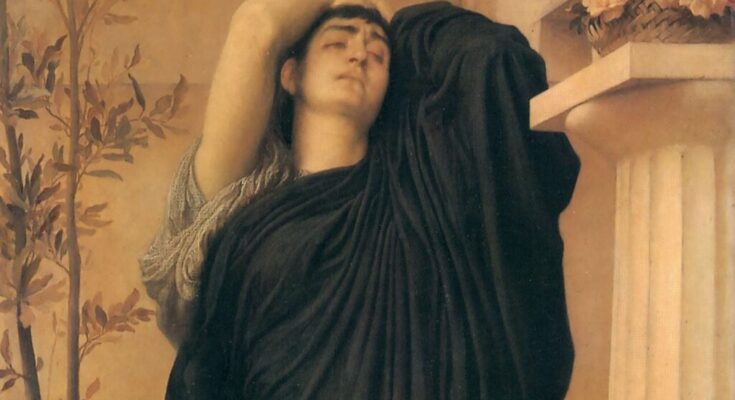
Electra was one of the most prominent and tragic figures in Greek mythology.
The daughter of King Agamemnon and Queen Clytemnestra of Mycenae, Electra was destined to live a life of extremes. Tragedy, murder, familial strife and revenge were what defined her life, shaping her character and informing her decisions.
This is why the story of Electra, her family and kingdom have inspired so many older and modern works of art.
Electra was a member of the House of Atreus and was predestined to experience terrible events in her lifetime. As the commander of the Greek army during the Trojan War, Agamemnon – Electra’s father – sealed the fate of his family.
Agamemnon sacrificed his daughter Iphigenia to appease the goddess Artemis and get the favorable winds he needed for his fleet, bringing hatred and a sense of urgency for revenge within his own family.
The murder of Electra’s father in Greek mythology
When Agamemnon fought for the glory of the Greeks in Troy, his wife Clytemnestra, along with her lover Aegisthus, were plotting his demise as revenge for what he did to Clytemnestra’s beloved daughter, Iphigenia.
Upon his arrival, Agamemnon was to face his destiny: In the company of Cassandra, a Trojan ”trophy” from his successful war efforts there, Agamemnon returned to his palace in Greece. There, Clytemnestra was ready to act. Agamemnon was brutally murdered, an event that defined Electra’s future, too.

Electra’s exile and unbearable grief
The period immediately following her father’s murder was a time of immense grief and torment for Electra. Not too long after she lost her beloved sister, Iphigenia, Electra was now a daughter without a father.
Separated from her brother Orestes, Electra remained in Mycenae to live under the leadership of her mother Clytemnestra and her lover Aegisthus.
This time was a time of deep mourning and reflection, something that made Electra sure about the necessity of action to bring justice to her family. The urge to attain revenge for the fate of her siblings was what drove her will to live.
The reunion of the siblings
Following the directive from the Oracle of Delphi to exact revenge for his father’s murder, Orestes returned to Mycenae years after his departure.
Electra was still there and, understandably, was ecstatic to see her brother again. Immediately, she decided to stay with him and support him in his vision to exact revenge on Clytemnestra and Aegisthus for their act of brutally murdering their father Agamemnon.
In the original tales of the story in Greek mythology, Electra plays various roles in the process of seeking revenge. In the tragedies of Aeschylus, Sophocles, and Euripides, for example, Electra is displayed with different approaches and positions. When it comes to the final moment of revenge, however, they all portray her as this tragic figure who was driven by the need to bring justice for the unnecessary murder of her father and sister.
Some of these stories view her as Orestes’ motivator and the person who encouraged him to commit matricide. However, others show her as a more submissive character who is overcome by her own sorrow and simply follows the events as they unfold in front of her.
The price of revenge
No matter how hard she tried to remain calm, Electra’s story in Greek mythology showed clearly the high price of retaliation and its impact on one’s life.
The Furies, the ancient goddesses of retribution, end up hunting Orestes down for the crime of matricide after their mother is eventually killed.
Electra is then left to deal with the consequences of her actions. She ends up having to find and restore the broken pieces of her family despite all the unspeakable deaths she witnessed within her immediate family circle.
For centuries, people have been captivated by the different aspects of Electra’s tale. Her life story offers us a remarkable view of the destructive force of anger, revenge and retaliation as well as of the intricate human abilities for love and hate.
Numerous works in literature and film have been inspired by Electra’s story in Greek mythology, ranging from contemporary modern versions to the classic plays of ancient Greek playwrights.
Even in the face of unimaginable tragedy and familial catastrophe, the story of Electra and her relatives in Greek mythology makes us directly face the difficult balance between justice, the cost of grief and the complicated relationships of family.



